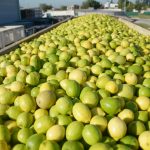Biological control tests underway in world's leading lemon export region

In light of the importance of lemon production in the northern Argentine province of Tucumán and growing constraints on pesticide residues in global markets, a group of researchers from a local university have decided to investigate new alternatives to treat citrus crops. At www.freshfruitportal.com, we spoke with Universidad Nacional de Tucumán researcher Julián Dib about the progress made in an initiative that could make biological control more widespread.
National Institute of Industrial Technology (INTI) figures show the province accounts for 84% of the South American country's lemon production, over a surface area of around 34,000 hectares; a level of cultivation that doesn't come easy when catering to demanding importers worldwide. 
Dib said the main problem for lemons after harvesting was the presence of fungi, particularly Penicillium, which was why the team embarked on the project to find a treatment alternative using yeast-based biological controls.
"The investigation consists of using some yeasts that have been isolated from the same citrus plants to fight these lemon postharvest diseases, or in other words, the solution to the problem comes from the same citrus plant," he said.
"In a way, what these yeasts do is delay the appearance of the fungus and others directly increase the fruit's shelf life."
He said the researchers had taken yeasts under the denomination 'killer' into account, which don't just kill or inhibit the growth of other yeasts but also act against fungi.
"Knowing this, we looked for yeasts and the first thing we did was in-vitro tests in the lab. We isolated a series of yeasts from citrus plants, a collection of approximately 400 yeasts, and within these we tried those with the phenotype 'killer'.
"When we found them we did tests against fungi which we knew were pathogens for lemons, and based on that, when it was already determined what the main candidates were, we went to live tests, or tests with fruit.
"We inoculated the fruit with the fungus and with the yeast, and well, we discovered that many yeasts were very efficient for controlling diseases."
Dib believed this meant the initiative was of vital importance for the sector, particularly given some European Union countries have phytosanitary barriers that prevent the entry of some fruits treated with fungicide.
"We are currently very advanced. We already have the best candidates to do a large-scale test. We lack molecular identification of the yeasts and also need to do some experiments to produce the yeasts on a large scale.
"The idea is that it will be useful for growers, and ideally to patent it if the system works. I believe that at the end of the year the issue will be more rounded. Obviously, to patent it would need prepatent studies, but for the end of the year we expect to already have more solid results."
Photo: www.shutterstock.com














































